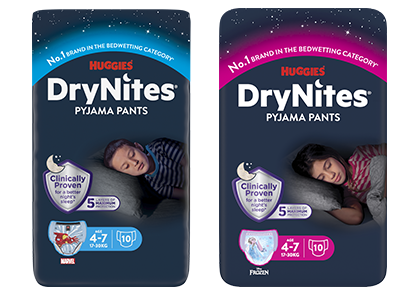
Get your free sample
Should my potty-trained three-to-four-year-old still be wet at night?
Many parents will say that their three- or four-year-old still regularly wets the bed at night. They wonder when this will stop and how they can help their child with night-time accidents.
Well, according to the
NHS, most children learn to stay dry at night between the ages of three and five, but for some it can take a little longer. According to NICE, approximately one in five children of four-and-a-half years wets the bed at least once a week.
If a child is 5-years-old or older, wetting the bed at night is considered a medical condition. If this is the case for your child, it’s worth
speaking to a doctor to see if there’s anything they can do to help.
However, more than three quarters of children are
fully toilet trained by the age of six, although children can
wet the bed into their teens.
What’s the best way to help my child with night-time accidents?
The best method of getting your three- to four-year-old to stay dry at night is with positive reinforcement. Make them feel good when they use the toilet successfully and offer reassurance, love, and cuddles when things don’t go according to plan.
Another great tip is to watch out for drier nights for at least a couple of weeks before tackling night-time training.
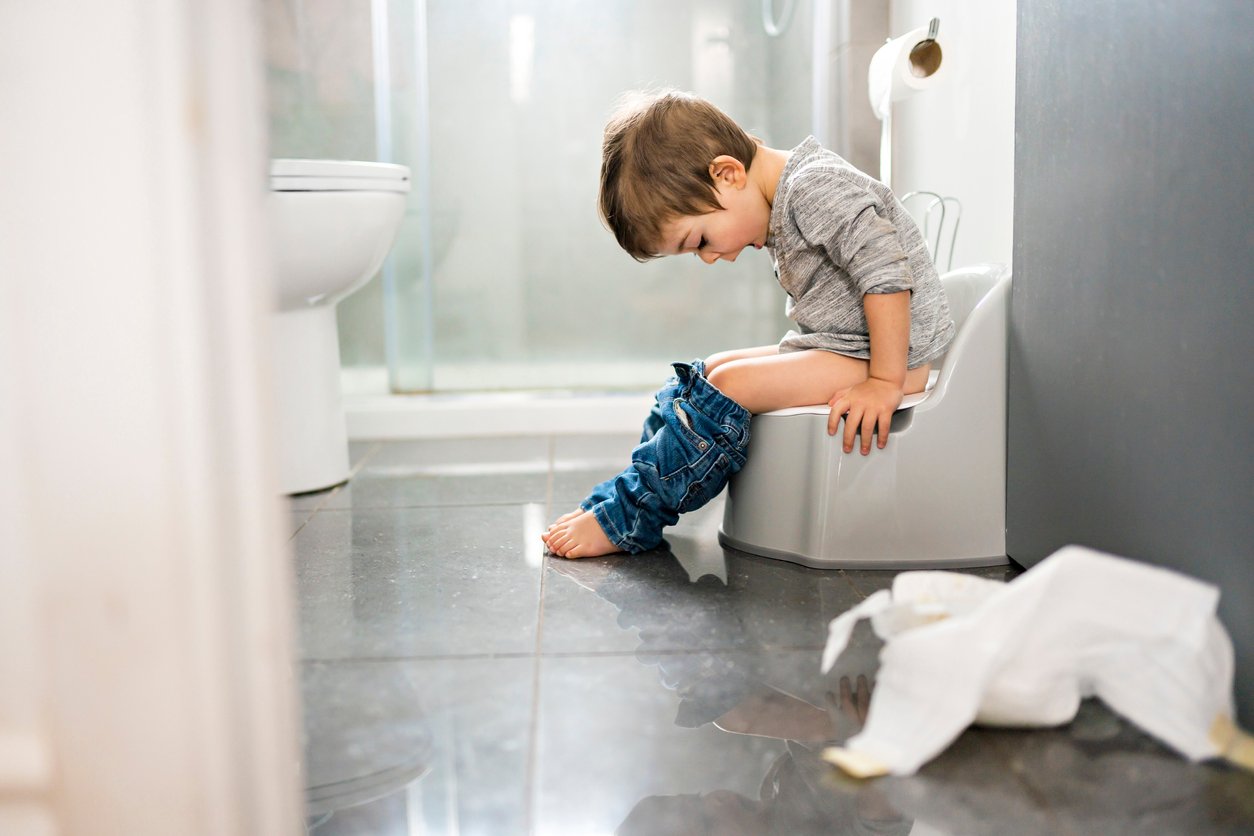
Why does my four-year-old wet the bed every night?
It’s not that they aren’t trying their best to stay dry—there are several reasons why your child might wet the bed at this age.
Stage of development
Wetting the bed at this age is very common. In fact, in the UK around 21% of all 4-and-a-half-year-olds wet the bed. Some children just take a little more time to recognise the feeling of needing to go to the loo.
Family
Sometimes, bedwetting is hereditary and can pass down through the “bedwetting gene”. Half of all children who suffer from bedwetting have a parent who also encountered bedwetting when they were a child.
Stress and changes
Stress and anxiety can play a role in your child's bedwetting. Things such as moving home and school, having a new baby, bereavements and other stressful situations can cause kids to wet the bed.
Medical reasons
A urinary tract infection (UTI) which can cause the frequent need to urinate; constipation and diabetes can cause bed wetting. In these cases, it is worth seeing a doctor about how you can ease and remedy these issues.
Are there things we should do to help prevent night-time accidents?
Your main mission is to help your child go to bed worry-free! Don’t let anxiety over bedwetting spoil their fun. Here are some practical, supportive and protective steps you can take to help your little one have a dry night’s sleep and wake up feeling awesome!
The do’s and don’ts of bedwetting
When it comes to bedwetting, do...
- Allow them plenty to drink during the day.
- Encourage your child to use the loo regularly.
- Make sure they use the loo at bedtime – but don’t rush this visit.
- Be helpful and encouraging and consider rewards for dry nights.
- Make sure their route to the loo is easy – leave doors ajar and a night light on.
- Leave a step stool in front of the loo at night.
- Make sure your child has enough roughage, fruit and vegetables in their diet to prevent constipation.
- Use positive and encouraging language.
- Use DryNites® Bed Mats to put over the mattress and keep spare bedding and night clothes right next to the bed so that night-time clean ups are quick and easy.
- Let your child wear DryNites® Pyjama Pants, which are clinically proven for a better night’s sleep, so that they do not have to worry or stress about wetting the bed.
- Keep a record of wet and dry nights to see if there is a pattern.
- Help your child to get clean and dry calmly and quickly if they have an accident, so that they – and you – can get back to sleep. Getting stressed or angry will impact just as much on your sleep as theirs.
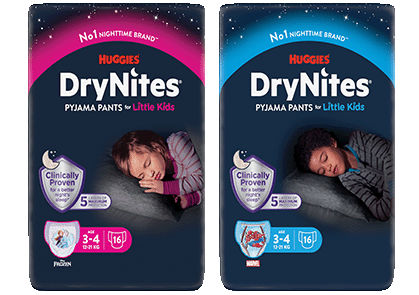
Order your Pyjama Pants from Amazon
When it comes to bedwetting, don't…
- Make a fuss - your child will learn to associate bedwetting with being in trouble. They may become unhappy, or try to hide it from you.
- Compare your child to others in their age group; every child is different.
- Offer drinks with caffeine in them, including tea, coffee, energy or sports drinks and cola. Caffeine is a diuretic, meaning it makes them pee more.
- Make your child feel ashamed or that they are ‘naughty’ for wetting the bed.
- Offer fruits before bedtime which are packed with fluid.
- Offer drinks directly before bedtime.
- Allow screen or other distractions from sleep in the bedroom.
- Wake your child in the night to use the loo – it’s more important that they sleep deeply.
“Should we use a bedwetting alarm?”
Some doctors suggest a bedwetting alarm, but these can prove disturbing to a child, and could potentially interrupt sleep. It may also make them feel like they’re doing something wrong.
“When should we see a doctor about bedwetting?”
Sometimes there may be a medical reason why your child has started to wet the bed at nights after they have been dry previously. See your doctor if they start to have wet nights when they were previously dry for at least six months and there have been no external stresses that might account for the change.
“If they have pain or burning when passing urine, they may have an UTI and should see the doctor. If your child starts to pee more frequently, especially at night, and develops swelling of the feet or ankles, this should also be medically checked.”
Our thanks to Amanda Jenner of the Potty Training Academy.
Expert advice for all things potty training and bedwetting
It’s all part of the adventure of growing up and becoming an adult. Use our guides to learn how to make potty training a breeze and support them through any subsequent accidents afterwards.
This doesn’t have to be a difficult time. Don’t worry, take a breath. We’ve got you.
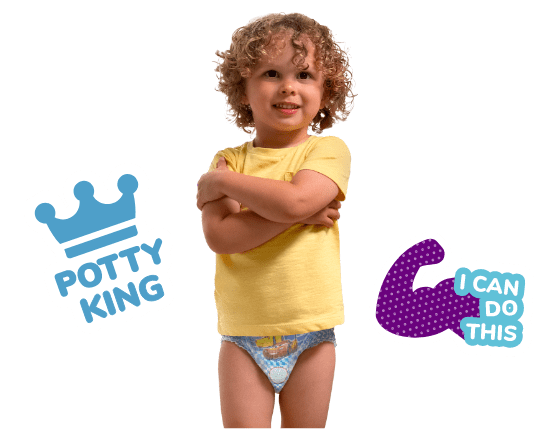
Get potty training tips and advice
Get exclusive offers, advice and information about your Big Kid's journey sent direct to your inbox.
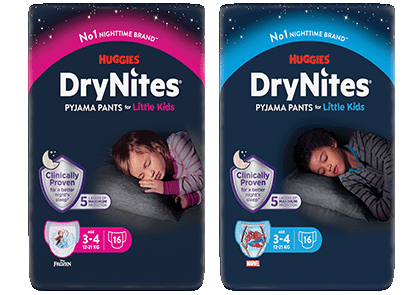
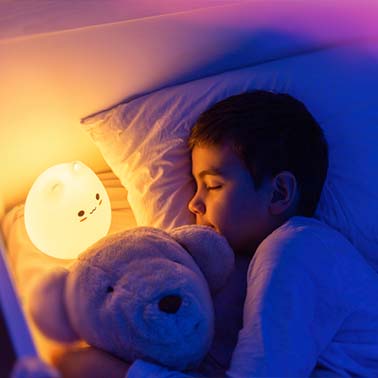

 your parenting partner
your parenting partner